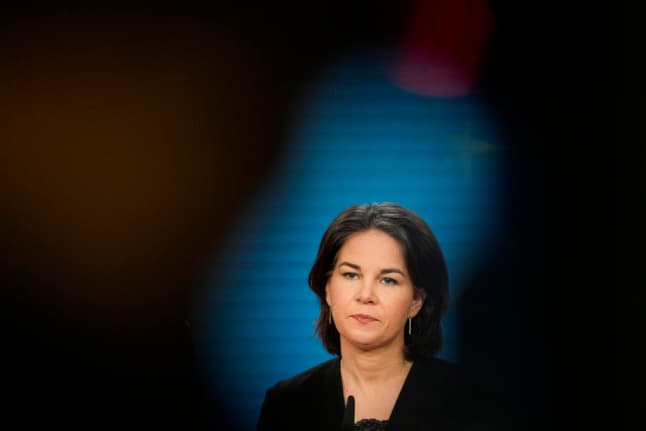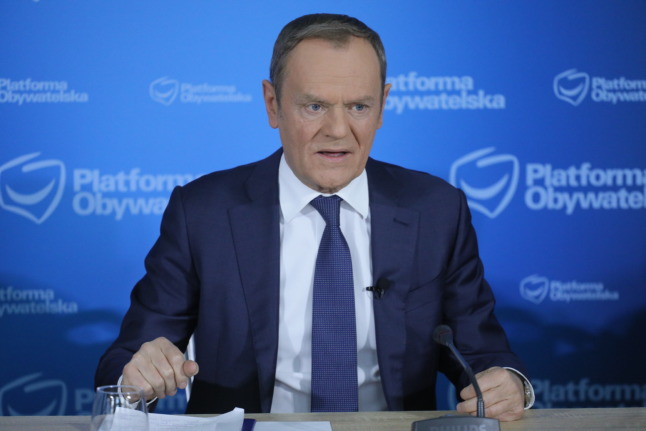Germany says EU will 'severely' sanction Putin

German Foreign Minister Annalena Baerbock on Friday said new sanctions against Russia would personally punish President Vladimir Putin and Foreign Minister Sergei Lavrov for their responsibility in the invasion of Ukraine.
"They are responsible for the death of innocent people in Ukraine. They are responsible that the international system is trampled and we as Europeans do not accept that," Baerbock said as she arrived for talks in Brussels.
As of Friday afternoon, it was unclear whether Putin and Lavrov would still be allowed to enter the EU without restrictions. Normally, indviduals who are sanctions lists also face entry bans, which would only be lifted with exceptional permission, for example for peace talks.
The punitive measures are part of a large sanctions package that is expected to come into force later today. The foreign ministers of the 27 EU states plan to sign off on the legal texts on Friday afternoon.
According to diplomats, the heads of state and government of the EU states agreed on the listing of Putin and Lavrov on the sanctions list on Thursday evening.
Though Russia's president is very unlikely to have assets abroad, the mention of Putin and his Foreign Minister in the sanctions list is intended as a symbolic show of resolve.
Other EU economic sanctions target the areas of energy, finance and transport. In addition, the EU is export controls on certain products and restrictions on visas in place.
Not so SWIFT
Two sanctions that experts believe would have the hardest impact - excluding from Russia from the SWIFT banking system and banning natural gas imports - were notably absent from the sanctions package on Friday.
The Society for Worldwide Interbank Financial Telecommunication, or SWIFT, does not actually handle any transfers of funds itself.
But the system is used by banks to send standardised messages about transfers of sums between themselves, transfers of sums for clients, and buy and sell orders for assets.
This means that a country shut out of it would face huge difficulties when attempting to trade with others and is generally considered the nuclear option when it comes to sanctions on Russia.
The lack of movement on SWIFT has been met with dismay by Ukrainian leaders, who have expressly called on Western allies to expel Moscow from the system that banks rely on to transfer money.
But US President Joe Biden revealed this week that while it remains an option, "right now that's not the position that the rest of Europe wishes to take."
READ ALSO: OPINION: This is Russia’s war, but we Europeans need to learn fast from our mistakes
He claimed that the action taken to freeze the assets of Russian banks would have a more severe impact than blocking access to SWIFT.
However, many political figures are deeply unhappy about the delay in excluding Russia from the transfer system.
Writing on Twitter, former European Council President Donald Tusk lashed out at the EU nations - including Germany - who are believed to have been responsible for obstructing the harder sanctions.

Former European Council President Donald Tusk speaks in Warsaw, Poland, on February 25th. Photo: picture alliance/dpa/PAP | Pawel Supernak
"In this war, everything is real: Putin's madness and cruelty, Ukrainian victims, bombs falling on Kyiv. Only your sanctions are pretended (sic)," Tusk wrote. "Those EU governments, which blocked tough decisions (i.e. Germany, Hungary, Italy) have disgraced themselves."
Speaking on public television on Friday, German Finance Minister Christian Lindner laid out starkly the preoccupation of Europe's biggest economy: suspension of SWIFT "would mean that there is a high risk that Germany will no longer receive gas, raw material supplies from Russia".
Lindner said he was "open" to including SWIFT "in the course of possible further toughening of sanctions" while adding that allies would "have to be aware of the consequences."
The EU, US and UK have all indicated the SWIFT is still on the table for a later date, and experts have predicted that Russia may retaliate to the sanctions by opting to cut off supplies of natural gas into Europe.
Up until recently, the Russian state-owned company Gazprom has supplied around 40 percent of the gas consumed in the EU, according to the EU Commission.
Germany, meanwhile, gets around 55 percent of its natural gas from Russia, accounting to around 25 percent of its total energy needs.
READ ALSO: ‘Historical failure’: Germany to hike military spending after years of underfunding
Comments (1)
See Also
"They are responsible for the death of innocent people in Ukraine. They are responsible that the international system is trampled and we as Europeans do not accept that," Baerbock said as she arrived for talks in Brussels.
As of Friday afternoon, it was unclear whether Putin and Lavrov would still be allowed to enter the EU without restrictions. Normally, indviduals who are sanctions lists also face entry bans, which would only be lifted with exceptional permission, for example for peace talks.
The punitive measures are part of a large sanctions package that is expected to come into force later today. The foreign ministers of the 27 EU states plan to sign off on the legal texts on Friday afternoon.
According to diplomats, the heads of state and government of the EU states agreed on the listing of Putin and Lavrov on the sanctions list on Thursday evening.
Though Russia's president is very unlikely to have assets abroad, the mention of Putin and his Foreign Minister in the sanctions list is intended as a symbolic show of resolve.
Other EU economic sanctions target the areas of energy, finance and transport. In addition, the EU is export controls on certain products and restrictions on visas in place.
Not so SWIFT
Two sanctions that experts believe would have the hardest impact - excluding from Russia from the SWIFT banking system and banning natural gas imports - were notably absent from the sanctions package on Friday.
The Society for Worldwide Interbank Financial Telecommunication, or SWIFT, does not actually handle any transfers of funds itself.
But the system is used by banks to send standardised messages about transfers of sums between themselves, transfers of sums for clients, and buy and sell orders for assets.
This means that a country shut out of it would face huge difficulties when attempting to trade with others and is generally considered the nuclear option when it comes to sanctions on Russia.
The lack of movement on SWIFT has been met with dismay by Ukrainian leaders, who have expressly called on Western allies to expel Moscow from the system that banks rely on to transfer money.
But US President Joe Biden revealed this week that while it remains an option, "right now that's not the position that the rest of Europe wishes to take."
READ ALSO: OPINION: This is Russia’s war, but we Europeans need to learn fast from our mistakes
He claimed that the action taken to freeze the assets of Russian banks would have a more severe impact than blocking access to SWIFT.
However, many political figures are deeply unhappy about the delay in excluding Russia from the transfer system.
Writing on Twitter, former European Council President Donald Tusk lashed out at the EU nations - including Germany - who are believed to have been responsible for obstructing the harder sanctions.

"In this war, everything is real: Putin's madness and cruelty, Ukrainian victims, bombs falling on Kyiv. Only your sanctions are pretended (sic)," Tusk wrote. "Those EU governments, which blocked tough decisions (i.e. Germany, Hungary, Italy) have disgraced themselves."
Speaking on public television on Friday, German Finance Minister Christian Lindner laid out starkly the preoccupation of Europe's biggest economy: suspension of SWIFT "would mean that there is a high risk that Germany will no longer receive gas, raw material supplies from Russia".
Lindner said he was "open" to including SWIFT "in the course of possible further toughening of sanctions" while adding that allies would "have to be aware of the consequences."
The EU, US and UK have all indicated the SWIFT is still on the table for a later date, and experts have predicted that Russia may retaliate to the sanctions by opting to cut off supplies of natural gas into Europe.
Up until recently, the Russian state-owned company Gazprom has supplied around 40 percent of the gas consumed in the EU, according to the EU Commission.
Germany, meanwhile, gets around 55 percent of its natural gas from Russia, accounting to around 25 percent of its total energy needs.
READ ALSO: ‘Historical failure’: Germany to hike military spending after years of underfunding
Join the conversation in our comments section below. Share your own views and experience and if you have a question or suggestion for our journalists then email us at [email protected].
Please keep comments civil, constructive and on topic – and make sure to read our terms of use before getting involved.
Please log in here to leave a comment.